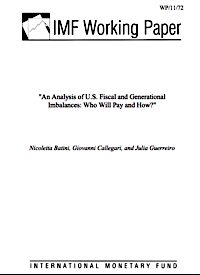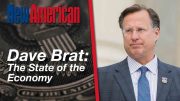
Economists at the International Monetary Fund (IMF) warned of U.S. government finances in disarray and out-of-control entitlement spending in a report published earlier this month, predicting a bleak future of significantly higher taxes for Americans even with less government spending.
Among the biggest problems cited in the report was government expenditures on health care and entitlements. The economists blamed the expansion of Medicare, an aging population, rapidly rising health-care costs and other factors for the “fiscal deterioration.” The so-called “stimulus” package also contributed to the unsustainable growth of deficits and public debt, according to the paper.
“The United States is facing an untenable fiscal situation due to the combination of high fiscal deficits, an aging population and rapid growth in government-provided healthcare benefits,” IMF economists Nicoletta Batini, Giovanni Callegari and Julia Guerreiro wrote in the introduction to the document.
The report, entitled An Analysis of US Fiscal and Generational Imbalances: Who Will Pay and How? also offered some forecasts. And they aren’t pretty. Solving the problem, according to the economists, will require some combination of massive tax hikes and greatly reduced government spending:
Under most scenarios, the fiscal adjustment needed to eliminate the fiscal and generational gaps would entail significant adjustments in taxes and/or transfers. Under the baseline scenario, for example, the federal government can restore fiscal balance by raising all taxes and cutting all transfer payments immediately and for the indefinite future by 35 percent.
As of right now, the bulk of the negative impact is expected to hit as-of-yet unborn Americans the hardest. “The burden of the U.S. fiscal adjustment falls squarely and fully on future generations, with current generations expected to receive a net flow of resources from the federal government,” the report stated. “[F]uture generations are expected to subsidize the entirety of current generations’ huge fiscal shortfall.”
On top of that, the report also warned that the longer the government waits to sort out the problem, the more expensive it will become to solve. As it stands, future Americans will have to pay over 20 percent more in net taxes than current newborns are expected to fork over, the economists warned. The situation is obviously not encouraging.
In its conclusion, the paper said reversing the Bush-era tax cuts and containing health-care costs would go “a long way” toward getting the U.S. government back on a fiscally sustainable footing. “A complete eradication of all imbalances would however require, on top of this, bold immediate and permanent increases in all taxes and cuts in all transfers as well,” it warned.
Of course, the fiscal train wreck is just one of many problems identified by IMF economists that is currently facing the U.S. government and the American economy. An IMF report from last year warned that there was an ongoing debate about the stability of the dollar and whether it would collapse.
But while the Fund, run by self-proclaimed socialist Dominique Strauss-Kahn, does accurately identify the existence of some problems, there’s more the story. Its analyses, according to critics, come up short in terms of explaining the causes and proposing solutions.
The IMF’s proposed solution to the looming dollar crisis, for example, is to establish an international fiat currency managed by a world central bank. A better option would be to restore sound money by repealing legal tender laws, according to countless economists whose forecasts have proven accurate over and over again.
In looking for answers to the fiscal calamity barreling toward America, IMF economists propose massive tax hikes combined with spending cuts. A better solution, according to constitutionalists who have been warning about these problems for decades, would be simpler and lead to superior outcomes in the long term: force the U.S. government to obey the Constitution by gradually ending all spending not specifically authorized under Article 1, Section 8.
Such a plan would immediately see government spending slashed, reducing deficits and allowing more wealth to remain in the productive economy. As the market took over functions previously monopolized, subsidized, or controlled by government, everybody would be better off.
Charities and families, having more resources at their disposal, would pick up where government left off. That would lead to a more efficient and productive allocation of resources while spurring the creation of more wealth for society as a whole.



